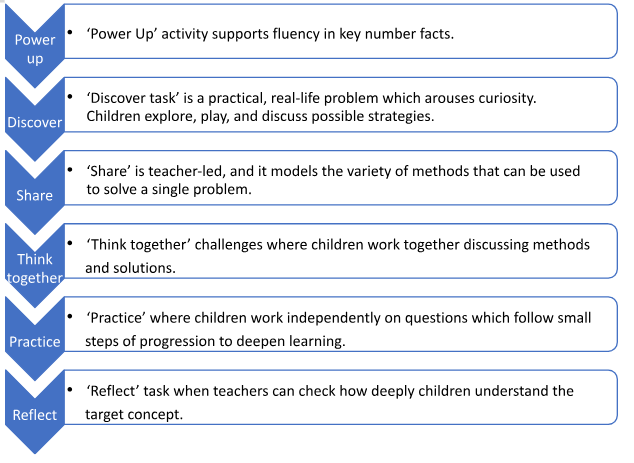INTENT
At Keyham Barton, we aim to teach our children a rich, progressive, and sequential Maths curriculum which develops their ability to calculate, reason and solve problems, enabling them to make sense of the world around them. We aim to provide high quality mathematical
learning experiences to develop children’s mathematical skills and understanding. Children are encouraged to explore Maths through practical experiences and investigative work, building a sense of enjoyment and curiosity about the subject.
We aim to give all our pupils, particularly the most disadvantaged, the knowledge,
experiences and ‘cultural capital’ necessary to become educated citizens and to succeed in life.
The aims of teaching Maths, as outlined in the National Curriculum, are to ensure that all pupils:
-
become fluent in the fundamentals of mathematics, including through varied and frequent practice with increasingly complex problems over time, so that pupils develop conceptual understanding and the ability to recall and apply knowledge rapidly and accurately.
-
reason mathematically by following a line of enquiry, conjecturing relationships and generalisations, and developing an argument, justification or proof using mathematical language
-
can solve problems by applying their mathematics to a variety of routine and non-routine problems with increasing sophistication, including breaking down problems into a series of simpler steps and persevering in seeking solutions.
IMPLEMENTATION
At Keyham Barton, we believe that all children can be successful in the study of mathematics. We use mixed ability groupings and do not group children by prior attainment, except for where significant gaps in learning exist. This is central to our Mastery approach to teaching and learning.
To achieve mastery, our expectation is that through quality first teaching, all our children will successfully access the learning. We expect most pupils to move through the programmes of study at broadly the same pace. However, for children who lack fluency, we provide opportunities to consolidate their understanding through additional scaffolding (this could be through adult support, concrete resources, or adapted work).
Across the school daily Maths lessons are taught where children:
-
practice fluency and the ability to recall and apply knowledge accurately and quickly
-
develop reasoning skills by following a line of enquiry, generalising or justifying proof using mathematical language
-
develop competence in solving increasingly complex problems
Early Years Foundation Stage
In EYFS, teachers use the Power Maths schemes of learning. These are matched to the National Curriculum Early Learning goals. In the Early Years, Maths is a specific area of learning in the Early Years Curriculum. Play based opportunities are carefully planned and provided by staff. The learning environment both inside and outside, is set up to create a stimulating space where children feel confident, secure, and challenged in their mathematical thinking.
Learning experiences provide children with the opportunity to explore, use their senses and become independent in their mathematical learning. Enhanced provision to meet the children’s next steps can be seen in the provision.
SEE IMAGE AT THE BOTTOM OF THIS PAGE FOR AN OVERVIEW.
Years 1-6
In Years 1-6, we follow the National Curriculum, using the Power Maths schemes of learning for curriculum planning to ensure progression across the year groups. It is a scheme of work recommended by the DfE and NCETM (National Centre of Excellence for the teaching of maths), which promotes a mastery approach to mathematics. It builds every concept in small, progressive steps and is built with interactive, whole class teaching in mind. It provides the tools needed to develop growth mindsets, check understanding throughout lessons and ensuring that every child is keeping up. The Power Maths curriculum covers units of learning in Number, Measurement and Geometry, Statistics, Algebra and Ratio and Proportion.
Power Maths
At the heart of Power Maths is a progressive lesson sequence designed to empower children to understand core concepts and grow in confidence.
Throughout each stage of the lesson, teachers check on children’s understanding through high
quality questioning enabling misconceptions to be quickly addressed.
In addition, we use White Rose, NCETM mastery resources and other resources such as IXL to challenge our more able children and deepen their understanding.
Numbots
Numbots is used both at home and in school by children in EYFS and KS1 to practice their basic number bonds and improve their addition and subtraction skills.
Times Tables Rock Stars (TTRS)
TTRS is used by children in Years 2-6 to practice their quick recall of times tables. It is an online resource which children can also access at home.
From years 1 – 6, there is a big focus on the develop of multiplication facts and fluency. This forms part of the homework and also the independent Maths provision in all classes, supporting children to know more and remember more.
IMPACT
Assessment
At Keyham Barton, we assess maths in the following ways:
-
Daily formative assessment which is used to inform next steps planning.
-
In EYFS, observations are recorded in children’s learning journals online through Tapestry and next steps are identified.
-
Times tables fluency progress checks
-
Power Maths end of unit checks
-
Termly teacher assessments
-
Termly NFER assessments
The impact of our maths curriculum is that children become confident and successful learners’ who can achieve regardless of their starting points. Assessments show that maths knowledge and skills are developing, and children can apply their skills and knowledge to more challenging problems.
Children across the school have positive attitudes towards their learning in maths and enjoy maths lessons.
Children make progress in maths from their starting points on entry and are closing the gap towards attaining national expectations. They are given opportunities to enable them to achieve the greater depth standard. It is our aim that all cohorts will achieve in line with or above national expectations and that they make good progress.

